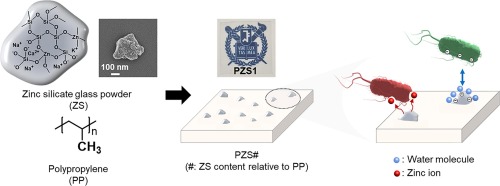Publication
Advanced Redox Technology Lab
Publication
Advanced Redox Technology Lab
Journal papers
Polypropylene (PP) is one of the widely utilized thermoplastics for ordinary applications, attributed to its excellent mechanical properties and resistance to heat and chemicals. However, during pandemic periods like the COVID-19 outbreak, the lack of antibacterial properties in PP might limit its usage as it does not effectively prevent bacterial adhesion and contamination. Therefore, to expand the applications of PP, it becomes crucial to impart antibacterial activity to make it a safer and more versatile material. Herein, we introduce a novel antimicrobial zinc silicate glass powder (ZS), prepared by incorporating a substantial amount of zinc oxide (35 wt%) into a silica network, as an antimicrobial filler in PP. We demonstrate that ZS significantly affects the overall performance of the PP composites, encompassing thermal properties, mechanical performances, and antimicrobial activities, while maintaining the optical transparency of PP. Notably, incorporating ZS results in a significant increase of hydrophilicity and the negative charge of the composite surface compared to the pristine PP surface, leading to the effective inhibition of microbial adhesion. This study offers valuable insights for developing antimicrobial fillers in PP composites by demonstrating the synergetic role of the physicochemical properties of ZS in imparting remarkable antibacterial activity and biocompatibility to PP.
